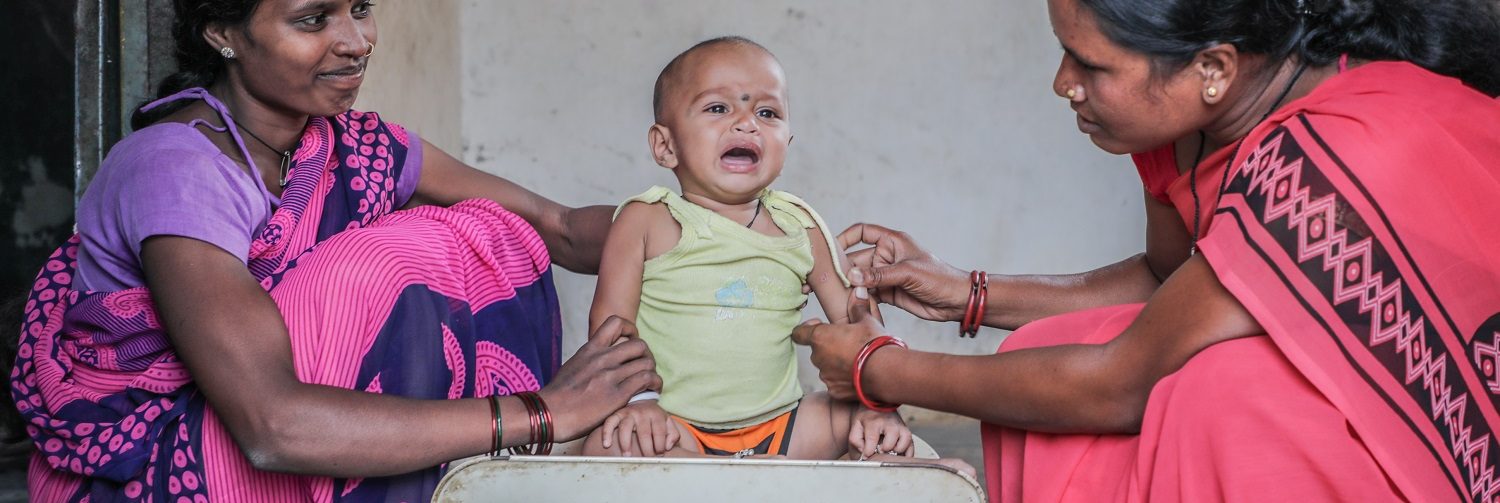
The International Food Policy Research Institute (IFPRI), NITI Aayog, and the International Institute for Population Science (IIPS) have established a research collaboration, funded by the Bill & Melinda Foundation under Partnerships and Opportunities to Strengthen and Harmonize Actions for Nutrition in India project, led by IFPRI. Under this research initiative, between December 2021 and June 2023, IFPRI, IIPS, and NITI Aayog conducted analysis of the National Family Health Survey (NFHS) data on topics of program and policy relevance including coverage of interventions, status of various nutrition outcomes and their determinants, reach of the Integrated Child Development Services (ICDS) program, intrahousehold clustering of multiple forms of malnutrition and success case studies of stunting and co-developed several knowledge products and manuscripts. On June 20, 2023, IFPRI, IIPS, and NITI Aayog hosted a hybrid event to share these findings with the nutrition community. This event was attended by 130 stakeholders from 40 organizations, including policymakers, development partners, academics, and civil society members.
The event began with Rasmi Avula, IFPRI and S.K. Singh, IIPS sharing the purpose and experiences with the collaboration. There were two sessions where the findings of various analyses were shared by the researchers and two discussants representing policy or program community and academia shared their thoughts on the relevance of findings to programs and areas for further research.
POSHAN Abhiyaan: Progress and opportunities
Rajib Sen, NITI Aayog and Tarun Shankar Choudhary, Society for Applied Studies (SAS) co-chaired the first session, which featured three papers that reflected on the reach of national programs and contributions to child outcomes. Rasmi Avula, IFPRI and Anita Christopher, IFPRI presented progress on the coverage of health and nutrition interventions in the first 1,000 days, decline in equity in coverage, and role of programs in achieving these improvements. Next, Suman Chakrabarti, IFPRI presented findings on the progress in the coverage of ICDS interventions and how various district supporting mechanisms played a role in achieving such improvements. S.K, Singh, IIPS shared the findings on how the improvements in ICDS utilization contributed to changes in undernutrition in India.
Rajib Sen, NITI Aayog reflected on the importance of examining both the efficiency and effectiveness of intervention implementation. He said it was critical to understand if the resources were being used optimally. Thereafter, Tarun Shankar Choudhary, SAS shared thoughts on the importance and need for costing and cost effectiveness analyses of combinations of interventions and the delivery platforms as a next research area to focus on.
Malnutrition across India: Digging deeper into trends and distribution
Soumya Swaminathan, M S Swaminathan Research Foundation (MSSRF) and Shweta Khandelwal, Centre for Chronic Disease Control (CCDC) chaired the second session, which showcased findings from three papers on nutrition outcomes, determinants and their trends and distribution, and subnational-level success cases in stunting. LK Dwivedi, IIPS shared trends in the double burden of malnutrition at the national- and sub-national levels and how the burden changed between 2006 and 2021, by place of residence and by wealth groups. Sarang Pedgaonkar, IIPS examined clustering of underweight and severe underweight within Uttar Pradesh. Rasmi Avula, IFPRI showcased the case of Bihar in how it succeeded in reducing stunting.
Soumya Swaminathan, MSSRF, in her reflections, reiterated the multifactorial nature of malnutrition and the importance of multisectoral approaches to addressing it. She emphasized the need for solutions to ensure healthy diets, reduce the reliance on processed foods, and account for the impact of working women on food preparation time. She urged the researchers to conduct in-depth analyses to understand the drivers of health and nutrition behaviors among individuals and propose effective actions for implementation. Shweta Khandelwal, CCDC emphasized the importance of adopting a life course approach to address malnutrition and to further research on understanding the role of gender, nutrition literacy, and the changing urban-rural landscape in influencing nutrition behaviors.
Looking forward: Accelerating nutrition improvements in India
Bharati Kulkarni, Indian Council of Medical Research set the stage for the panel discussion. She commended the progress achieved, including improvements in intervention coverage, the reductions in inequities between wealth quintiles, and the strong focus on the first 1,000 days. She urged researchers to take a comprehensive approach taking into consideration food systems, markets, agriculture, and consumer behavior.
The panel discussion was moderated by Purnima Menon, IFPRI and CGIAR who began the session by reflecting on the partnership between IFPRI, IIPS, and NITI Aayog, the principles that guided the partnership and its evolution, which resulted in bringing together of these important policy-relevant findings. Deepika Chaudhery, World Bank commented on the importance of sharing positive stories and showcasing the wins of the programmatic efforts. She also identified action points to continue the gains made in the coverage of interventions: (1) include infants and children in the coverage of interventions, (2) prioritize home visits, (3) provide a supportive environment for maternal nutrition through ICDS, (4) focus on the 6-23-month window for infant feeding, and (6) ensure high quality monitoring and data use. Sylvie Chamois, UNICEF focused on reaching the last mile. She mentioned that there are many children and women who either do not have access to nutrition interventions or have access to but are not utilizing these services. She raised the issues of climate change and potential disasters that can affect vulnerable populations. S.K Singh, IIPS mentioned that two areas need special focus in future research, including infant and young child feeding and gender.
For a comprehensive list of publications and resources produced or co-produced by IFPRI, please visit https://poshan.ifpri.info/publications-and-resources/

